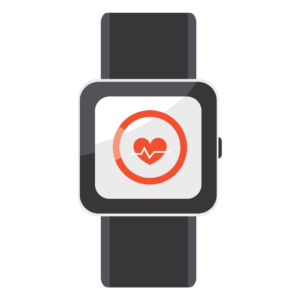Do you have a fitness tracker? Like a Fitbit or an Apple watch or something similar?
If you’re not familiar with these, they’re usually a watch-like device you wear around your wrist, that can monitor all sorts of things for you (described below). They tend to range around $40 – $600, depending on the features that you want in one.
If so, I’m curious what it was that made you want to wear one? Some people wear them as a watch, some people wear them as a heart rate monitor, some people wear them to track steps and activity, and some people wear them to get more insight into their sleep.
There are lots of reasons why people might want to try one out, and those are different reasons for everyone.
What Do They Track?
Fitness trackers have the ability to collect a LOT of data. As a scientist, I adore data. If you’re someone who likes data too, a fitness tracker might be a great fit for you.
A fitness tracker can track things like your heart rate, daily steps, blood oxygen levels, GPS location, sleep patterns.
Fitness trackers can also usually be used as a watch, to receive call and text notifications, as an mp3 player, and even as a digital currency intermediary (I did not know you could use these trackers to pay for things; I’m learning new things all the time).
But, I have a very unpopular opinion about fitness trackers.
I don’t like them.
Let me explain what I feel are the pros and cons of them are, and why I don’t wear one.
Pros
I think the biggest pro that fitness trackers offer is awareness. They bring awareness to whatever it is you’re looking to track. Whether that’s your movement or your heart rate or your sleep, they can track it, and can make you aware of it.
Awareness is something I do talk about and feel very positive about. We can’t change, adjust, fix, or optimize anything we aren’t aware of.
So, awareness is always the first step. And that is something that fitness trackers do really well.
If you are looking to incorporate more movement into your life, and you’re not sure where you are starting from, a fitness tracker can be a great way to figure out your baseline.
If you’d like to monitor your heart rate for any reason, they can be a helpful tool.

Cons
Accuracy of fitness trackers are always in question. While they will give you some baseline information that you can work from, if you’re looking for really exact numbers of your heart rate, your blood oxygen, or any other metric, you might need some more precise tools.
The accuracy of the step tracker in the tracker is probably just as accurate as any other pedometer. I don’t believe that any of them are perfect, but the tracker is likely a great tool for this.
But here are the 3 things I don’t love about fitness trackers.
- It is easy to become obsessed with your fitness tracker, and have it drive your daily decisions. It can take the decision away from you. If you are not feeling well, but your fitness tracker is telling you that you haven’t gotten enough steps in today and you need to go walking, you need to make the final decision based on how you’re feeling. Some days you won’t need (or want) to get 10,000 steps in each day.
It’s easy to say this out loud, but sometimes acting on it is a different story all together. Having the ability to know what’s necessary for you is something that you know much, much better than your tracker.
- There are two types of motivation. Internal motivation comes from within. It’s when we have a desire to achieve something, that’s driven by something within us.
External motivation comes from our outside environment. It’s when we do something to please someone else, or for someone else’s benefit, or for an external reward. If you decide you want to go for a run so you can eat dessert tonight, the dessert is external motivation.
It’s very easy for the fitness tracker to become a source of external motivation. We take more steps, we do mindfulness exercises, we track our heartrate because our Fitbit tells us that we need to. And we become driven by what we think our Fitbit thinks of us, rather than how we are actually feeling.
The best motivation you can have that will entice you to move regularly, eat well, get enough sleep, and manage your stress levels is feeling good. When we feel good inside, we feel good outside. And when we feel good inside and outside, we’re more likely to keep up the behaviours that make us feel good.
When we pay attention to how we feel, keeping up good habits starts to come from internal motivation. And healthy habits that are internally motivated are much more likely to stay around for a long time. - Getting insight into how you sleep is another driving factor for people to wear a fitness tracker. They might be able to tell you how often you wake or how often you’re tossing and turning, and I can’t speak to the accuracy of that data.
While I can appreciate that this information might be helpful for people, especially if you struggle with sleep, they won’t tell you a complete picture of your sleep. For a really in depth assessment of your sleep, you’ll need to do a sleep study, which you can talk to your doctor about requesting. If you feel like you sleep all night, but you’re still exhausted, a sleep study would be highly recommended to rule out sleep apnea. And a fitness tracker definitely can’t diagnose sleep apnea.

The reason I don’t wear a tracker is because I like to base my daily decisions on how I’m feeling on any given day. I don’t want to feel like I need to keep up because my fitness tracker says I should. And I’m not comfortable sleeping with an electronic device around my wrist every night.
But that’s just me! Lots of people love their trackers and find them really helpful tools. They can provide some great information, as long as you’re aware of where your motivation is coming from and the limitations of them.
Tell me – what are your thoughts on fitness trackers?
P.S. If you’re looking for a quick laugh, check out this Baroness Von Sketch video on fitness trackers.
